Newtown High School is an accredited public high school in Newtown, Connecticut, United States. As of the 2018–2019 school year, the school serves 1,571 students in grades 9–12 and employs 141 faculty members. It is the only high school of the Newtown Public Schools.
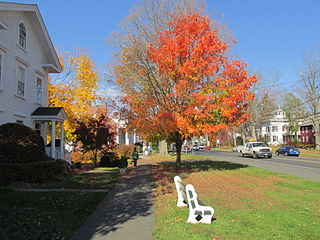
Newtown is a town in Fairfield County, Connecticut, United States. It is part of the Greater Danbury metropolitan area as well as the New York metropolitan area. Newtown was founded in 1705, and later incorporated in 1711. As of the 2020 census, its population was 27,173.

The Wilcox, Crittenden Mill, also known as Wilcox, Crittenden Mill Historic District, is a 17-acre (6.9 ha) property in Middletown, Connecticut that was listed on the National Register of Historic Places in 1986. It was the location of the Wilcox, Crittenden company, a marine hardware firm. The historic district listing included four contributing buildings and three other contributing sites.

Sandy Hook is a village in the town of Newtown, Connecticut. It was founded in 1711. It was listed as a census-designated place prior to the 2020 census.
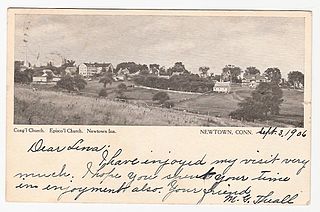
The history of Newtown, Connecticut.

Woonsocket Rubber Company Mill is an historic mill at 60-82 Main Street in Woonsocket, Rhode Island. The mill consists of a series of 3- and 4-story brick buildings built between 1865 and 1875 by Edward Harris, one of Woonsocket's leading businessmen. These buildings housed the Woonsocket Rubbert Company, one of Rhode Island's first manufacturer of rubber products, principally shoes, boots, and rubberized fabric. In 1910 the complex was purchased by the Falls Yarn Company, which used it for the production of fine woolen yarns.

The Bigelow Carpet Company Woolen Mills are a historic mill complex on Main Street in Clinton, Massachusetts. The sprawling mill complex was built or expanded by the Bigelow Carpet Company, one of Clinton's leading business for much of the 19th and early 20th centuries. The complex was listed on the National Register of Historic Places in 1983. It continues to be adaptively reused by smaller businesses.

The Hose Station No. 1 is a historic building located in downtown Davenport, Iowa, United States. It was listed on the National Register of Historic Places in 1983 and on the Davenport Register of Historic Properties in 1999. In 2019 it was included as a contributing property in the Davenport Motor Row and Industrial Historic District.
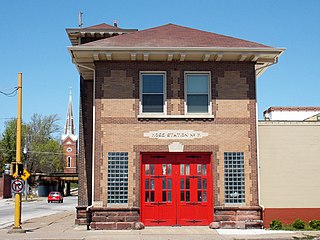
The Hose Station No. 7 is located along a busy thoroughfare in a light industrial area of the west end of Davenport, Iowa, United States. It was listed on the National Register of Historic Places in 1983.

Minterburn Mill is a former textile mill complex located at 215 East Main Street, in the Rockville village of Vernon, Connecticut. Developed beginning in 1834, it was the first place in Rockville to be developed industrially, and the surviving buildings provide a view of evolutionary changes in mill architecture. The mill was listed on the National Register of Historic Places in 1984. It was converted into an apartment complex in 2016 by the state.

The Page Belting Company Mills is a historic mechanical belt mill complex at 26 Commercial Street in Concord, New Hampshire, United States. Located north of Concord's central business district near Horseshoe Pond, the complex consists of four brick buildings built between 1892 and 1906 for one of the city's major businesses. The mill complex, now converted to residential and other uses, was listed on the National Register of Historic Places in 2002.

The Mechanical Fabric Company is a historic factory complex on Cromwell and Sprague Streets in the West End neighborhood of Providence, Rhode Island.
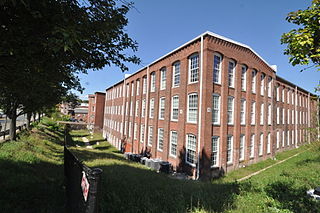
The Nashawannuck Mills Historic District of Easthampton, Massachusetts encompasses a 19th-century industrial complex on Cottage Street in the heart of the town. Most of the connected series of brick buildings were built between about 1848 and 1870, although the facilities were used for industrial purposes until 1970. The oldest building erected was by Samuel Williston for a button factory. Powered by a dam that impounded Bound Brook, the facility expanded in both size and function, eventually becoming a major producer of elastic fabrics for goods such as suspenders and webbing. The industrial works were the major economic engine in Easthampton into the 20th century. The district was listed on the National Register of Historic Places in 2015.
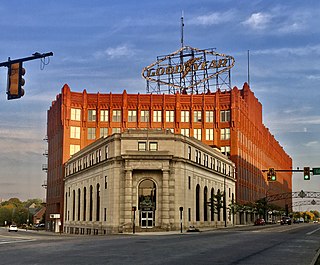
Goodyear Hall-Ohio Savings and Trust Company is a historic building located in Akron, Ohio, US. The building is situated at 1201 E. Market Street, at the corner of Goodyear Avenue and East Market Street. The structure is seven stories in height, built of brick and tile.

The Broad Brook Company was a manufacturer of textiles in East Windsor, Connecticut, which operated from the 1830s until 1954. The company plant, located on Broad Brook at Main Street and Scott Road in the town's Broad Brook village, was listed on the National Register of Historic Places in 1985. Partially destroyed by fire, with surviving buildings converted into residential condominiums in the 1980s, the complex has been shuttered due to the discovery of toxic soil conditions on the property.

The H.C. White Company Mill Complex, is a historic industrial complex at 140 Water Street in North Bennington, Vermont. The White Company was founded in 1879, producing stereographic viewers and stereograph cards, as well as the Kiddie-Kar, a three-wheeled wooden scooter for children. These premises were occupied by the company from then until its closure in 1935. The complex, with buildings dating from 1887 to 1919, was listed on the National Register of Historic Places in 2017.

The M. Armstrong and Company Carriage Factory is a historic carriage factory building at 433 Chapel St. in New Haven, Connecticut. Built in 1882, it is one of a small number of surviving 19th-century carriage factories in a city that once had more than 50 such businesses. It was listed on the National Register of Historic Places in 2011.

The American Mills Web Shop is a historic industrial complex at Orange Avenue and Front Street in West Haven, Connecticut. Developed between 1903 and 1914, it is a good example of industrial development of the period. The complex was listed on the National Register of Historic Places in 1983.

The Home Woolen Company is a historic textile mill complex on Main Street in Beacon Falls, Connecticut. Developed between 1853 and 1916, the complex housed major local employers, engaged first in the manufacture of woolens and rubber products. The complex has been converted to residential use. It was listed on the National Register of Historic Places in 1984.



















